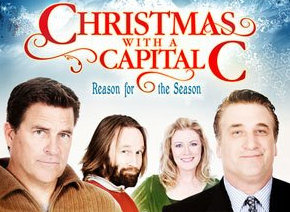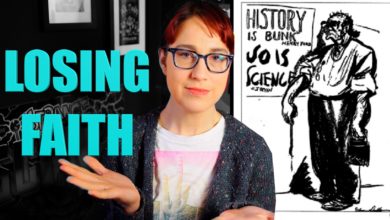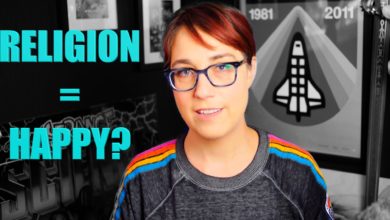Why You Should Watch Christmas with a Capital C (Seriously)

Last year at Skepticon, I gave a talk about Christmas, and how it’s fun to lie to children. I also talked a bit about the War on Christmas and how dumb it is, and I showed this preview for a movie called Christmas with a Capital C:
I couldn’t find the movie anywhere, so I had to go by what the trailer suggested: the movie was about an evil atheist Grinch (named Mitch Bright!) who came to a small town in order to outlaw Christmas. I knew the movie was made by a Christian production company and I knew the title came from a terrible Christian song about how nobody should ever say “happy holidays” because it makes the baby Jesus cry. Therefore, I mocked the movie mercilessly.
Well, last month a few people contacted me to let me know that the movie was finally available on Netflix. I was so excited! I sat down with some wine and prepared myself for what was sure to be the worst movie ever.
I was totally wrong.
I don’t want to spoil the film for you, but let me just tell you that it was not, in fact, about an evil atheist outlawing Christmas. The Christian protagonist was not portrayed as being saintly and infallible. And most surprising of all, separation of church and state was fairly well explained and respected.
I was so surprised that I immediately set out to talk to someone involved in the making of the film. I still wasn’t completely sure that I hadn’t misinterpreted the message of the movie, so I needed some validation. I contacted the director, Helmut Schleppi, who immediately agreed to be interviewed on the record. He’s Dutch, and he identifies as a Christian but more in terms of spirituality, and not so much in terms of organized religion.
Schleppi: “We don’t have that whole issue where there’s a fight about whether you can put up a scene on city property, that’s not an issue because you can’t do that and it’s always been that way. So for me to hear about this whole thing, it was pretty new, and I was pretty surprised about it, that you could have a fight and sue each other over what you can put on city property and what you can’t.”
Me: “So you weren’t familiar with the War on Christmas before you took the film on?”
Schleppi: “No! [Laughs] No, I found it quite funny and I thought it was a parable, that it wasn’t a real situation. It sounded outrageous to me, that you could have a fit over a situation like this. But apparently it’s happening, there are places in America where this is an issue. Maybe if they watch this movie, they’ll see how to resolve this.”
I asked Helmut how he got involved, and he told me he was friends with the screenwriter. “I had the same reservations that you had,” he said. “I was afraid that it would be very black and white.”
I wondered if they had been aiming for a fundamentalist Christian audience who were concerned about the War on Christmas. “I think if those people watch it,” he said, “they will probably not be happy . . . I’m not sure those people will get what they want out of it. I think it’s a pretty subtle story. I think the marketing is aimed to Christians, that’s true, but I see the response from people who are not Christians who say that it’s a pretty good movie.”
I pressed him about the trailer’s representation of the movie. “I maybe would have edited it differently,” he said, “but I’m not the guy who has to sell it. Does the trailer represent the movie? Well, what trailer does?”
When I had more questions about the message in the movie, Helmut very kindly referred me to the screenwriter, Andrea Gyertson Nasfell. I gave her a call to get a few more answers.
I started by thanking Andrea for talking to me. “Well thank you for actually watching the whole movie,” she said. “Because one thing I have felt is that it is a very good message if you make it to the end, but it has been marketed very politically.”
Nasfell has written several screenplays for the production company, so they came to her when they wanted a new Christmas movie. I was most interested in hearing how she adapted the song Christmas with a Capital C into a movie that seemed to have the opposite message. She was very delicate:
“I listened to the song, and I was not too sure how to make that song into a movie because it was so political. I thought, ‘Well what if we took the problem that the song presents – the debate over the establishment clause – and what if we turn it on its head and focus the discussion on what Christmas is supposed to be about.'”
She said she didn’t interact with the band at all during the writing process. They were allowed to give input on the script, but for the most part her first draft made it through to the screen relatively unscathed. She did point out that Daniel Baldwin, who plays the atheist in the film, “actually pulled out some lines that he thought were too much like ‘let me twist my mustachio and laugh evilly’, which I really appreciated.” That really surprised me, because Stephen Baldwin is well-known for being a bit of a kooky fundamentalist Christian, but apparently Daniel at least was interested in making his atheist character as three-dimensional as possible.
I asked Nasfell to talk a little bit more about her development of the script: “There are Christians out there who feel defensive because they feel their freedom of speech is being encroached upon, and so they react very strongly. And there are places where what happens in the movie happens, and people get upset about that. So the first thing I did was research it: ok, what’s legal and what’s not. And I was kind of surprised at what I found, which is that there’s a very narrow sort of situation where it’s illegal to display the Nativity. So I decided to make that very narrow situation the one that was in the movie so I could clarify that.”
She explains how that particular situation gave her the opportunity to write a clearcut scene in which a judge sits down with everyone and explains their options: they can take the Nativity down, they can allow other religious displays alongside the Nativity, or they can sell the Nativity to a private citizen to display.
“I thought that was pretty impressive, and I think that a lot of people didn’t know that, the people who are angry about Christmas being taken away. I feel like they didn’t know how much opportunity there was to celebrate the holiday the way they want. I think there’s sort of less of a war on Christmas than what Christians sometimes perceive it to be.”
I was really impressed with Nasfell’s interest in learning the facts and remaining balanced. She was even open to a bit of criticism when I pointed out how some of Mitch Bright’s characteristics were stereotypically grumpy atheist. She pointed out that she wanted to make it clear in the film that Mitch wasn’t grumpy because he was an atheist, but because he had had a tough time in life, like one scene where it’s revealed that he had some “bad investments,” alluding to insider trading.
I pointed out that the insider trading thing was also problematic, because atheists are often seen as amoral or immoral by many Christians. “I wouldn’t have put that together,” Nasfell said. “He really was trying to help the town . . . and I’d be interested in getting your opinion on this but I really did try to make Dan [the Christian] someone who wasn’t always perfect, either. He didn’t always do the right thing.”
And she’s totally right. Both the characters were flawed . . . it’s just that I get worried that a majority Christian audience will see Mitch’s flaws as being typically atheist behaviors while excusing Dan’s as being minor mistakes that he corrects in the end. But when a screenwriter makes an honest effort to balance all the characters, then that’s a problem that really lies with the audience.
I really enjoyed talking to both Nasfell and Schleppi, because they’re Christians who I think are on our side, in terms of protecting freedom of/from religion and encouraging others to do so as well. Christmas with a Capital C may or may not become a part of the average atheist’s holiday viewing, but at the very least we can be happy knowing that it puts out a message that we want more Christians to get behind.





oh c’mon everyone knows there is only one good christmas movie in existence… Die Hard
but seriously I usually avoid any christmas movies that comes my way, and not because I’m an atheist, even back when I was a christian I could never stand watching them, they just all seems so… happy. But if this gets the Watson stamp of approval I just may give it a go.
*Cough*Gremlins*cough*
I’m with ineedavacation on this. Christmas movies are to be avoided like the plague. But I will give this one a go.
I live in one of the most secular parts of one of the most secular countries on this planet, The Netherlands, so that whole War on Christmas etc. is new to me. Like my compatriot Schleppi said, it isn’t an issue over here. I’ve never seen a nativity scene and other religious christmas stuff in public in my home town. It is simply not done.
First I’ll have to finish the Swedish/Danish crime thriller The Bridge – damn my brother for bringing along the box set! – and then I’m going to dive into the weird world of an American christmas.
Seasonal Greetings!
It just goes to show how distortionary a trailer can be. Though I guess that’s not a huge insight given how you were able to recut the trailer to reverse its sentiment.
Excellent reporting. Makes me very curious about the film and somewhat more optimistic about the future of film-making.
Is it weird that it’s a relief to see someone really trying to dig out the whole story rather than just reacting to headlines? Thanks, Rebecca. :)
Yeah, I saw the trailer and was likewise unimpressed. Then I thought..Buffy’s Angel vs a Baldwin???… wait a moment!! DANIEL Baldwin.. Ima gonna see this shite.
Now with Rebecca’s endorsement (that’s what it is, right?) Ima gonna defs get a pirated copy and watch it.
Christmas is still gobshite, but screenwriters are people too. It’s the background noise to my childhood. That and cricket on Boxing day.
Totally agreed, Rebecca. I watched this a few weeks ago, and right from the first scene with Ted McGinley and the guy who played his brother, I kept pausing it, turning to my wife, and asking her, “Are they seriously making these guys assholes or what?”
It was ASTOUNDING. I kept pinching myself, and for a while I was sure that I must be such a jaded atheistic bastard that I was seeing any portrayal of a Christian as being a negative character. Until they introduced Ted’s wife, who was also very Christian but was recognizably a nice person who exercised empathy.
Once Daniel Baldwin started having substantial scenes, I was expecting him to be as much of an asshole as the Christian mayor, BUT HE WASN’T. Aside from the one scene where he shows some anger at having grown up in a town where religion was shoved down his throat, he makes the most sense of anyone in the movie!
If it’s even possible, the mayor’s brother is even more of an asshole, but the crowning scene is where he goes off on his would-be girlfriend for saying “Happy Holidays.” What’s more, he’s actually quoting directly from the lyrics of the song that supposedly inspired the movie. That’s right- the Christian pop band’s words are placed in the mouth of the most socially unacceptable person, doing the most socially unacceptable thing of the entire movie.
In fact, I’ll go so far as to say that this is one of the most important tools on the secular side of the “War on Christmas.” Every person who is worried about the FFRF or American Atheists with their crazy billboards and plaques should watch this movie. I think the RDF should buy truckloads of this movie to be sent to every church in America. For realsies.
Very, VERY well written and interesting Rebecca. I will definitely search out this film. It is important for us to be familiar with opposing views. It is also interesting to see a movie or a book that is made by someone outside of “us” utilize critical thinking and fact based data in their process as well. I always worry about how the extremists effect the middle. Perhaps the middle can effect the extreme this time.
What’s this about “War on Christmas and how dumb it is”? I noticed that Heina’s recent post appropriately characterized the “War on Christmas” as “alleged.” We should consider why sectarian defenders of Christmas are threatened by such supposed acts of war as expressed wishes of happy holidays instead of merry Christmas this time of year.
http://www.slate.com/articles/news_and_politics/fighting_words/2005/12/bah_humbug.html
I watched this movie recently too and I was also surprised – and almost disappointed since I was in the mood for a bad movie. I didn’t think the movie was great mind you; I thought it was fairly boring and the acting was lacking, but it did several things well.
I actually love that they marketed the movie to the persecuted christian complex, only to have it pull the meaning around the other side. I also thought the atheist character was the most likable, but I wish the christian guys seemed more contrite at the end. His brother (hippy hair I call him) actually really creeped me out.
I don’t like Christmas movies as a whole. We have a few we watch with the kids, and I don’t think I’ll go out of my way to watch this one again, but it was quite different than I expected.
Hi Rebecca,
I just stumbled upon this article. I played Reverend Tiller in ‘Christmas.’ I thought you wrote a very fair, insightful review of the film. Since I am a non-believer, I too was impressed with the way Andrea had crafted the story and was happy to be a part of the project.
Since they filmed entirely in Seward, Alaska, some of the actors you see are are from our quite vibrant theatre community. The exec was lifetime Alaskan producer, David Cuddy. He and producer James Chankin were both eager to cast “locally” where they could.
I had wondered what would be different about working on a “faith-based” movie set. I had worked on a film produced by an Indian company and we actually had to wait on set on the first day for the right astrological moment to begin filming. Vedic astrology, I found, allowed for recession, but is certainly no less goofy that the western version.
It turned out that the ‘Christmas’ set like any other I had been on: Everyone working hard to ‘get the day.’ If there was any “message” on set, it was to get it lit and shoot it.
I am quite pleased with the finished product. I discovered on this film that there is a huge market for faith-based films. I have had friends from all over the country, and elsewhere, contacting me to have a laugh about my playing a man of God, (or worse, review my performance.) Consequently, due to the far-flung feedback, I believe this picture has become a bit of a cross-over success.
Thank you for an interesting read,
Ron Holmstrom